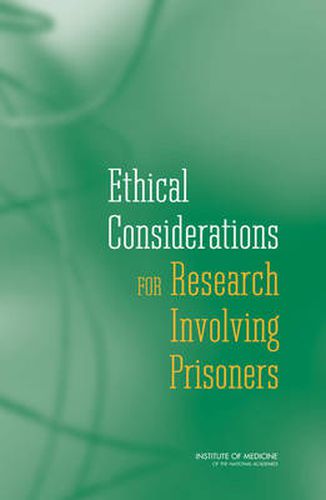Readings Newsletter
Become a Readings Member to make your shopping experience even easier.
Sign in or sign up for free!
You’re not far away from qualifying for FREE standard shipping within Australia
You’ve qualified for FREE standard shipping within Australia
The cart is loading…






In the past 30 years, the population of prisoners in the United States has expanded almost 5-fold, correctional facilities are increasingly overcrowded, and more of the country’s disadvantaged populations - racial minorities, women, people with mental illness, and people with communicable diseases such as HIV/AIDS, hepatitis C, and tuberculosis are under correctional supervision. Because prisoners face restrictions on liberty and autonomy, have limited privacy, and often receive inadequate health care, they require specific protections when involved in research, particularly in today’s correctional settings.Given these issues, the Department of Health and Human Services’ Office for Human Research Protections commissioned the Institute of Medicine to review the ethical considerations regarding research involving prisoners. The resulting analysis contained in this book, Ethical Considerations for Research Involving Prisoners , emphasizes five broad actions to provide prisoners involved in research with critically important protections: expand the definition of ‘prisoner’; ensure universally and consistently applied standards of protection; shift from a category-based to a risk-benefit approach to research review; update the ethical framework to include collaborative responsibility; and, enhance systematic oversight of research involving prisoners.
$9.00 standard shipping within Australia
FREE standard shipping within Australia for orders over $100.00
Express & International shipping calculated at checkout
In the past 30 years, the population of prisoners in the United States has expanded almost 5-fold, correctional facilities are increasingly overcrowded, and more of the country’s disadvantaged populations - racial minorities, women, people with mental illness, and people with communicable diseases such as HIV/AIDS, hepatitis C, and tuberculosis are under correctional supervision. Because prisoners face restrictions on liberty and autonomy, have limited privacy, and often receive inadequate health care, they require specific protections when involved in research, particularly in today’s correctional settings.Given these issues, the Department of Health and Human Services’ Office for Human Research Protections commissioned the Institute of Medicine to review the ethical considerations regarding research involving prisoners. The resulting analysis contained in this book, Ethical Considerations for Research Involving Prisoners , emphasizes five broad actions to provide prisoners involved in research with critically important protections: expand the definition of ‘prisoner’; ensure universally and consistently applied standards of protection; shift from a category-based to a risk-benefit approach to research review; update the ethical framework to include collaborative responsibility; and, enhance systematic oversight of research involving prisoners.